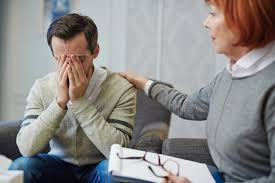If you are one of the millions of people who suffer from OCD, then you know that intrusive thoughts are a big part of your life. Thoughts about harm coming to loved ones, fear of contamination, and doubts about things you have done can be constantly swirling around in your head. One type of intrusive thought that is particularly common is thoughts about events that have happened. This type of OCD is called “real event OCD.” In this blog post, we will discuss what real event OCD is, how to cope with it, and where to find help.
Contents
What Is Real Event OCD?
 Real event OCD is a type of OCD in which a person becomes fixated on a particular event or experience that has happened in their life. The event may be traumatic, such as a car accident, or it may be something that was simply embarrassing, such as saying something stupid in front of others.
Real event OCD is a type of OCD in which a person becomes fixated on a particular event or experience that has happened in their life. The event may be traumatic, such as a car accident, or it may be something that was simply embarrassing, such as saying something stupid in front of others.
Regardless of the nature of the event, people with real event OCD will obsessively replay the event in their mind, and may also avoid situations that remind them of the event. This can lead to significant distress and disruption in their lives.
It is also believed that people who have suffered real events with OCD are more likely to develop post-traumatic stress disorder (PTSD). According to studies, it is found that people with Real Event OCD are more likely to have a comorbid diagnosis of PTSD than those with other types of OCD. If you are struggling with Real Event OCD, it is important to seek professional help.
Otherwise, the condition can have a significant impact on your quality of life. This condition is treatable, and with the right help, you can learn to manage your symptoms and live a full life.
What Are Some Symptoms To Recognize?
It is important to be aware of the symptoms of real-event OCD to get the proper help and treatment. Some symptoms may include:
- Intrusive, persistent, and unwanted thoughts about a past event
- Avoidance of people, places, or things associated with the event
- Intense anxiety or fear related to the event
- Repeatedly going over the details of the event in your mind
- Spending excessive amounts of time researching the event or looking for information about it
- Feeling guilty or ashamed of what happened
- Difficulty functioning in day-to-day life due to obsessions and compulsions
The symptoms of real-event OCD can be debilitating and have a significant impact on your quality of life. Moreover, this type of OCD can be difficult to treat because it is often based on a real event. However, there are effective treatments available.
You should be aware of the symptoms of real-event OCD to get the proper help and treatment. Because this is not something that will go away on its own, the sooner you get help, the better. If you think you may have real-event OCD, please reach out to a mental health professional for help.
What Causes Real Event OCD?
 There are many possible causes of real event OCD. Let’s discuss some of the common causes and risk factors of real-event OCD. These include:
There are many possible causes of real event OCD. Let’s discuss some of the common causes and risk factors of real-event OCD. These include:
A history of trauma or abuse
Traumatic events can trigger real event OCD. This is especially true if the event was not resolved healthily. Also, some studies suggest a link between abuse and OCD. Because of this, people who have a history of abuse are more likely to develop real-event OCD.
Family history of OCD or other anxiety disorders
This is one of the most significant risk factors for real-event OCD. If you have a family member with OCD, you’re more likely to develop the disorder yourself. It is believed that a person with real event OCD is about three times more likely to have a parent or sibling with OCD. For example, if your mother has OCD, you’re more likely to develop real event OCD than someone whose mother does not have OCD.
Certain medical conditions
Some medical conditions can increase the risk of developing real event OCD. These include:
- Neurological conditions, such as Tourette’s syndrome or epilepsy
- Certain physical illnesses, such as Lyme disease
- Certain mental health conditions, such as depression or anxiety
It’s important to note that having one or more of these risk factors does not mean that you will develop real event OCD. However, it does increase your likelihood of developing the disorder.
Other possible risk factors
There are several other possible risk factors for developing real event OCD. Some of the risk factors are:
- Neglect: This is defined as a lack of love, care, and attention from parents or primary caregivers. This can lead to feelings of insecurity and anxiety.
- Abuse: It is possible that people who have experienced abuse, either physical or sexual, are more likely to develop real event OCD. This is because they may feel that they are not safe in the world and that bad things are going to happen to them.
- Family disruption: This is something that can happen when there is a divorce, death, or other major events that disrupt the family unit. This can lead to feelings of insecurity and anxiety.
- Relationship issues: People with real event OCD may have difficulty in relationships. This is because they may be afraid of abandonment or rejection. They may also have trouble trusting people.
These risk factors can lead to the development of real event OCD. If you have any of these risk factors, it is important to get help from a mental health professional. More often, people with real event OCD will need to see a therapist who specializes in OCD. This is because real event OCD can be a very difficult disorder to treat. If you have real event OCD, there are treatment options available to you.
How It can be Treated?
The problem can be really tough to deal with but it is not impossible. But there are treatment options that can help you. Let’s discuss some of the treatments for this condition:
Cognitive-behavioral therapy
 This is one of the most effective treatments for OCD. It helps people learn how to change their thoughts and behaviors. It is also believed that CBT can help people learn how to better deal with their anxiety. CBT aims at helping people identify their triggers and then learn how to better deal with them. Some of the common things CBT provides:
This is one of the most effective treatments for OCD. It helps people learn how to change their thoughts and behaviors. It is also believed that CBT can help people learn how to better deal with their anxiety. CBT aims at helping people identify their triggers and then learn how to better deal with them. Some of the common things CBT provides:
- Relaxation techniques
- Stress management
- Cognitive restructuring
- Healthy coping mechanisms
- Relief symptoms
In fact, studies have shown that CBT can be even more effective when combined with medication. So, if you are dealing with real-event OCD, cognitive-behavioral therapy is definitely worth considering.
Exposure and response prevention therapy
This is another effective treatment for OCD. It involves gradually exposing yourself to your fears and learning how to cope with the anxiety that comes with it. This can be done with the help of a therapist or on your own. In this, there is no need to try and suppress your thoughts or feelings. The goal is to face them head-on and learn how to deal with them in a healthy way.
For example, if you are afraid of dirt and germs, you would gradually expose yourself to dirt and germs. This could involve touching doorknobs and using public restrooms. At first, you may feel a great deal of anxiety and fear. But with time and practice, you will learn how to cope with these feelings and the anxiety will lessen.
Psychotherapy
It is important to seek professional help if you think you may have any type of OCD. A therapist will be able to help you understand your thoughts and feelings and develop a treatment plan. If you are struggling with real event OCD, some specific types of therapy may be helpful.
Moreover, there are several techniques used in psychotherapy for OCD that can help learn how to cope with intrusive thoughts about real-life events. Some of these therapies include:
- Talk therapy
- Dialectical behavior therapy
- Family-based therapy
- Group therapy
- Psychodynamic therapy
Psychotherapy is often combined with medication to treat OCD. If you are struggling with real event OCD, seeking professional help is an important first step.
Medication
 People who are struggling with real event OCD often find that medication can help reduce their anxiety and improve their ability to cope. There are a variety of different medications that can be effective, so it’s important to work with a doctor to find the right one for you. Some of the examples include:
People who are struggling with real event OCD often find that medication can help reduce their anxiety and improve their ability to cope. There are a variety of different medications that can be effective, so it’s important to work with a doctor to find the right one for you. Some of the examples include:
- Selective serotonin reuptake inhibitors (SSRIs)
- Serotonin and norepinephrine reuptake inhibitors (SNRIs)
- Tricyclic antidepressants (TCAs)
- Monoamine oxidase inhibitors (MAOIs)
It is important to discuss all potential risks and side effects of medication with your doctor before starting any new medication. Medication is often used in combination with therapy to provide the best possible treatment for real-event OCD.
These are treatment options for Real Event OCD. If you or someone you know is struggling with Real Event OCD, please reach out for help. There are many resources available to provide support and treatment. You are not alone in this battle.
How To Manage Real Event OCD?
There are some of the things that you can do to manage your real event OCD. These include:
Practice mindfulness
This means that you need to be aware of the present moment and your surroundings. You should also be aware of your thoughts and feelings. It is considered that mindfulness is one of the best ways to cope with any type of OCD. There are several ways that you can practice mindfulness. One way is to meditate. This will help you to focus on your breath and be in the present moment.
In addition, you can also try deep breathing which will help you to relax. Because real event OCD is often triggered by anxiety, you must find ways to reduce your anxiety levels.
Challenge your thoughts
 It can be helpful to challenge the thoughts that are associated with your anxiety. For example, if you’re worried about getting sick, you might remind yourself that you’re healthy and have never gotten sick before. If you’re worried about making a mistake, you might remind yourself that everyone makes mistakes and that it’s not the end of the world if you do.
It can be helpful to challenge the thoughts that are associated with your anxiety. For example, if you’re worried about getting sick, you might remind yourself that you’re healthy and have never gotten sick before. If you’re worried about making a mistake, you might remind yourself that everyone makes mistakes and that it’s not the end of the world if you do.
For example, let’s say you’re worried about getting sick. A helpful thought would be, “I’m healthy and have never gotten sick before.” In this way, you’re challenging the fear that you will get sick.
Identify your triggers
In real events OCD, people are afraid of something bad happening to them or someone they love. The fear is usually related to a specific event, such as getting sick, being in an accident, or being attacked. To help you manage your real event OCD, it’s important to first identify your triggers. Once you know what sets off your anxiety, you can start to develop a plan to cope with it.
When you identify your triggers, it can help to manage your anxiety at the moment. For example, if you know that seeing blood makes you anxious, you can avoid situations where you might see blood.
Talk to someone who understands
This is probably the most important thing you can do. Talk to a therapist, psychiatrist, or anyone who will understand and be supportive. If you have friends or family who are supportive, confide in them. Don’t try to go through this alone. This condition can make you feel very isolated and alone, but you are not. Some people understand and can help you to recover.
Moreover, you can try to keep a journal. This can help you to track your thoughts and progress. It can also be a way to vent all the pent-up anxiety and stress. Be honest with yourself in your journal. Don’t try to hide anything. This is for you and no one else.
A healthy lifestyle
 This is one of the most important things that everyone should do. It is not only good for your physical health but also your mental health. A healthy lifestyle includes:
This is one of the most important things that everyone should do. It is not only good for your physical health but also your mental health. A healthy lifestyle includes:
- Eating a balanced and healthy diet
- Getting enough sleep
- Exercising regularly
- Avoiding unhealthy habits such as smoking and drinking too much alcohol
If you are suffering from real event OCD, it is important to follow a healthy lifestyle to improve your quality of life. Another thing that can help you cope with real event OCD is to connect with others who have the same condition. You should be aware of the fact that you are not alone and that other people understand what you are going through.
These are some of the things that can help you cope with real-event OCD. If you are suffering from this condition, it is important to seek professional help. Remember that you are not alone and that there is help available.
Conclusion
To conclude, real-event OCD can be extremely distressing and debilitating, but there are treatments available that can help. This condition is often misunderstood, so it is important to educate yourself and others about it. If you think you may have real-event OCD, please reach out to a mental health professional for help.
Moreover, if you know someone who is struggling with real-event OCD, be supportive and understanding. This condition can be very difficult to cope with, but with the right treatment, people can and do recover. Thus, you should not feel discouraged if you or someone you know is struggling with this condition. Recovery is possible!
For more information and tips you can contact Therapy Mantra. We have a team of professional therapists who can provide you with the support and guidance you need to recover from this condition. Contact us today to learn more about our services. You can also book an online counseling and therapy session or download our free OCD treatment app on Android or iOS.


